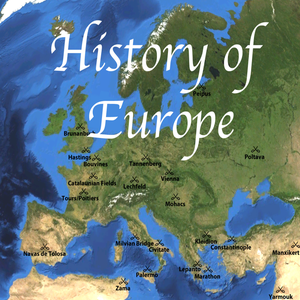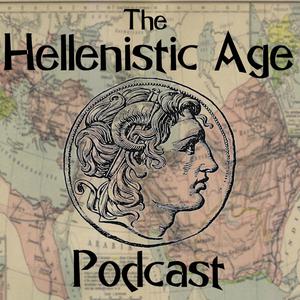
A History of Europe, Key Battles
Carl Rylett
Key Battles
- 37 minutes 56 seconds75.1 Interview with Stuart E Eizenstat
A special episode where I interview Stuart E Eizenstat - an American diplomat and attorney.
Mr Einzenstat worked on Jimmy Carter's 1976 presidential campaign. After winning said campaign he became President Jimmy Carter’s Chief Domestic Policy Adviser.
Later he went on to become President Bill Clinton's Deputy Secretary of the Treasury. And he served as the United States Ambassador to the European Union from 1993 to 1996
Mr Eizenstat has also devoted much effort to various aspects of Holocaust Restitution, successfully negotiating major agreements with the Swiss, Germans, Austrian and French, and other European countries.
He has recently written a book called the Art of Diplomacy in which he recounts how American negotiators reached historic agreements that changed the world.
https://www.amazon.co.uk/Art-International-Diplomacy-Stuart-Eizenstat/dp/1538167999
Hosted on Acast. See acast.com/privacy for more information.
29 May 2024, 12:00 pm - 20 minutes 32 seconds74.19 Treaty of Versailles
The Paris Peace consisted of a group of distinct treaties, but the main concern of the delegates was the settlement with Germany, embodied in the Treaty of Versailles signed in June 1919.
Germany’s eastern frontiers presented far greater problems.
www.patreon.com/historyeurope
www.historyeurope.net
Music composed by Edward Elgar, Enigma variations, Variation IX (Adagio) Nimrod
Picture - Treaty of Versailles, Big Four
Theme tune for the podcast by Nico Vettese, www.wetalkofdreams.com
Hosted on Acast. See acast.com/privacy for more information.
20 October 2023, 4:00 pm - 21 minutes 32 seconds74.18 Endgame, 1918
In Spring 1918 a massive German offensive made significant territorial gains, but ultimately not the intended breakthrough, and the Allied forces stood firm. Exhausted and demoralised at the scale of casualties, the Germans were pushed back in a major counter-attack in the late Summer and Autumn. And on 26 September, the Allies launched a general offensive along the entire Western Front.
Meanwhile, the Habsburg empire was fast falling apart as various nationalities declared independence.
www.patreon.com/historyeurope
www.historyeurope.net
Music composed by Alexander Scriabin, Etude in C sharp minor. Courtesy of musopen.org
Picture - US 64th regiment celebrate the Armistice
Theme tune for the podcast by Nico Vettese, www.wetalkofdreams.com
Hosted on Acast. See acast.com/privacy for more information.
29 September 2023, 4:00 pm - 20 minutes 40 seconds74.17 The Final Gamble, 1918
After the Russian withdrawal from the frontlines following the October revolution, the treaty of Brest-Litovsk is negotiated between Germany and Russia.
The Germans sought to conclude war on the Eastern Front as quickly as possible, while at the same time trying to establish an informal empire in east-central Europe, one composed of newly independent nation states on Russia’s western periphery. However, back on the German home front, after four harsh winters and widespread hunger, political unity was fraying, and riots and strikes occurred across the country.
Everything now depended on the success or failure of a German Spring Offensive on the western front.
www.patreon.com/historyeurope
www.historyeurope.net
Picture - German Spring Offensive - British Lewis gun team at the Battle of Hazebrouck 1918
Hosted on Acast. See acast.com/privacy for more information.
8 September 2023, 4:00 pm - 24 minutes74.16 War of Attrition on the Western Front 1917
While the nations of Europe fought each other to a bitter stalemate, the President of the United States, Woodrow Wilson, urged both sides to make peace. However, no agreement is made and the United States joined the war on the side of the Entente allies.
In the meantime, the Germans ordered a general withdrawal at the western front, abandoning the battlefields of the Somme in order to establish a shorter, straighter and more well-fortified line, the so-called ‘Hindenburg Line’. The eastern front is more volatile, seeing the collapse of the Russian army, a major defeat for the Italians at Caporetto and the fall of Jerusalem to the British
www.patreon.com/historyeurope
www.historyeurope.net
Music composed by Vaughan Williams (Fantasia on a Theme by Thomas Tallis), courtesy of musopen.org
Picture - Allenby enters Jerusalem 1917
Theme tune for the podcast by Nico Vettese, www.wetalkofdreams.com
Hosted on Acast. See acast.com/privacy for more information.
28 July 2023, 4:00 pm - 21 minutes 55 seconds74.15 The Russian Revolution 1917
As the year 1917 dawned, Europe had been at war for two and a half years, and pressures on the home fronts were becoming intolerable. Every participant nation came under huge strain.
In Russia the Tsarist regime falls in March, but the interim government is unstable and itself falls in the famous October Revolution, led by Vladimir Lenin, who promises to withdraw Russia from the war.
www.patreon.com/historyeurope
www.historyeurope.net
Music composed by Frederich Chopin (The Polish Dancer)
Picture - Vladimir Lenin, 1 May 1920 by Isaak_Brodsky
Theme tune for the podcast by Nico Vettese, www.wetalkofdreams.com
Hosted on Acast. See acast.com/privacy for more information.
14 July 2023, 4:00 pm - 26 minutes 39 seconds74.14 Battles of Verdun and The Somme 1916
Europe entered the year 1916 exhausted by one and a half years of conflict of a scale hitherto unimaginable, with profound effects on citizens at home, as well as those on the front line.
The most intensive battles on the western front in 1916 are at Verdun and the Somme, with extraordinary numbers of casualties.
Meanwhile, on the eastern front the Russians launch a major attack, the Brusilov offensive.
Romania declared war on Austro-Hungary on 27 August 1916 and promptly invaded Transylvannia.
www.patreon.com/historyeurope
www.historyeurope.net
Music composed by Erik Satie (Gymnopédie no. 1), Nikolai Rimsky-Korsakov (Russian Easter Festival Overture, Op. 36)
Picture - Verdun - Gervais-Courtellemont_french_anti-aircraft_guns
Theme tune for the podcast by Nico Vettese, www.wetalkofdreams.com
Hosted on Acast. See acast.com/privacy for more information.
30 June 2023, 4:00 pm - 21 minutes 49 seconds74.13 Eastern and Western Fronts 1915
For the Germans, 1915 was a year that should not have been. Their whole strategy had been based on a quick war, but they now found themselves embroiled in a two-front war – on the eastern front against Russia, and on the western front against France fully mobilised and also Britain.
Throughout 1915, in a succession of attacks of increasing intensity, the various armies learned the techniques of the new kind of war at very heavy cost.
In February 1915, Germany launched the Second Battle of the Masurian Lakes with an attack on the Russians in East Prussia. Meanwhile, the Austrians attempted to push deep back into Galicia, with huge numbers of casualties on all sides.
www.patreon.com/historyeurope
www.historyeurope.net
Music composed by Frederich Chopin, Mazurka in C sharp minor, Op. 6 no. 2
Picture - Skoda_305_mm_Model_1911_LOC_War_of_the_Nations
Theme tune for the podcast by Nico Vettese, www.wetalkofdreams.com
Hosted on Acast. See acast.com/privacy for more information.
16 June 2023, 4:00 pm - 20 minutes 6 seconds74.12 Turkey and Italy Enter the War, 1915
The first months of fighting in the First World War had seen no major breakthrough from any side. The Germans had captured about ten percent of France, and reached within sixty miles of Paris, but then reached a stalemate as both sides fortified their positions with great long lines of trenches running from Belgium to the Swiss border.
Both sides attempt to bring other countries into the war to help break the stalemate and to tip the balance in their favour. The Italians, though deeply divided, decide in the end to join the side of Britain, France and Russia. And an allied attack against the Ottomans fails at Gallipoli.
www.patreon.com/historyeurope
www.historyeurope.net
Music composed by Freredich Chopin, Mazurka in C Sharp Minor
Picture - Sinking of the Lusitania
Theme tune for the podcast by Nico Vettese, www.wetalkofdreams.com
Hosted on Acast. See acast.com/privacy for more information.
2 June 2023, 4:00 pm - 25 minutes 50 seconds74.11 The Eastern Front 1914
The Russians strike hard against their most powerful enemy, Germany. Austro-Hungary help their German ally although their military forces are under-resourced, in large part because through the years the Hungarian parliament had restricted military finding by using it as a bargaining chip for political concessions.
While the Austrians attack Serbia, the Germans achieve a significant victory against Russia at the Battle of Tannenberg.
www.patreon.com/historyeurope
www.historyeurope.net
Music composed by Alexander Scriabin - Etude in C Sharp Minor
Picture - Tannenberg Bundesarchiv, East Prussian German Infantry
Theme tune for the podcast by Nico Vettese, www.wetalkofdreams.com
Hosted on Acast. See acast.com/privacy for more information.
26 May 2023, 4:00 pm - 17 minutes 42 seconds74.10 The Western Front 1914
The first main clash of the First World War was on the borders of France and Germany and in Belgium. The Belgians put up more resistance than the Germans expect. However, the Battle of the Frontiers, on the Franco-German border, from 7 August to 6 September 1914 was a disaster for the French army, who suffered very heavy casualties. Meanwhile, the British Expeditionary Force were making their way to the front.
The war was set on a grim path of attritional fighting, and with both sides able to draw on millions more men it became virtually impossible to secure an easy victory. As stalemate was reached, the dreadful realisation set in that the combatants would be in this for the long haul.
www.patreon.com/historyeurope
www.historyeurope.net
Music composed by Sergei Rachmaninoff (Preludes, Op. 32, Lento, in B minor)
Picture - French Bayonet Charge
Theme tune for the podcast by Nico Vettese, www.wetalkofdreams.com
Hosted on Acast. See acast.com/privacy for more information.
12 May 2023, 4:00 pm - More Episodes? Get the App
Your feedback is valuable to us. Should you encounter any bugs, glitches, lack of functionality or other problems, please email us on [email protected] or join Moon.FM Telegram Group where you can talk directly to the dev team who are happy to answer any queries.
 The Hellenistic Age Podcast
The Hellenistic Age Podcast
 Pax Britannica: A History of the British Empire
Pax Britannica: A History of the British Empire
 Reconquista
Reconquista
 The History of England
The History of England
 The Ancient World
The Ancient World
 The History of Byzantium
The History of Byzantium